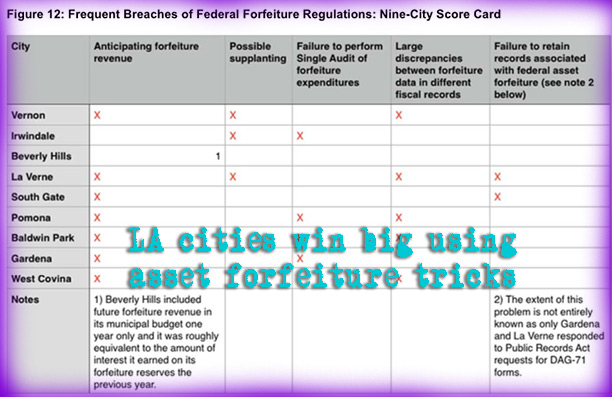NEW REPORT REVEALS TROUBLING POLICING FOR PROFIT IN CITIES IN LOS ANGELES COUNTY
Today (Tuesday), the Drug Policy Alliance is launching Above the Law: An Investigation of Civil Asset Forfeiture Abuses in California, a multi-year, in-depth review of civil asset forfeiture abuses that appear to have gotten out of hand in some of California cities, particularly a cluster of small cities in LA County.
Asset forfeiture laws allow government entities to keep money, cars, real estate, and other property that may be associated with a crime (usually a drug crime).
The US Department of Justice’s asset forfeiture law—called the Equitable Sharing Program—authorizes law enforcement agencies to use the seized money as revenue. But the DOJ program has turned civil asset forfeiture into a serious cash cow for under-funded law enforcement agencies.
On the federal level, to keep seized money, agencies only have to produce “probable cause” that laws have been broken. The people whose property is seized do not even have to be charged with a crime, according to federal law. And because those people have to jump through fiery hoops to prove they legally acquired the money or property that officers took from them, they do not often win it back.
In California, law enforcement cannot keep assets under $25,000 unless the owner is convicted, and for amounts above $25,000, officers have to be able to give “clear and convincing evidence” beyond a reasonable doubt, that the cash or property was connected to a crime.
According to the report, law enforcement agencies in smaller California cities are circumventing the state’s stricter asset seizure regulations by pursuing the forfeitures at the federal level (through which they also get to keep a higher percentage of the forfeiture proceeds).
In Los Angeles County, Baldwin Park, Beverly Hills, Gardena, Irwindale, La Verne, Pomona, South Gate, Vernon and West Covina lead the entire state on per capita seizures, according to the Drug Policy Alliance.
Irwindale has collected $802,856 in forfeited assets; Bakersfield, which is 244 times bigger, has collected $571,796.
La Verne has collected $3,015,283; Oakland, which is twelve times more populous, has collected $2,281,597.
Despite having a population that is more than five times smaller than Sacramento’s, and more than ten times smaller than San Jose’s, Baldwin Park has collected $5,011,449, more than San Jose ($2,651,112) and Sacramento ($1,416,500) combined.
South Gate has seized $8,091,207; San Jose, whose population is ten times greater, has federal forfeiture revenues of $2,651,112.
Pomona’s forfeiture revenues of $14,302,274 exceed the combined forfeiture revenues of Oakland ($2,281,597), Fresno ($3,958,725), Long Beach ($4,410,910) and Bakersfield ($571,796), whose total populations are more than 11 times greater than Pomona’s.
Baldwin Park Police Captain David Reynoso says taking the federal route to seize assets is more advantageous for the department than running forfeitures through the state.
…veteran state and local law enforcement officers agree that the greater share of proceeds available to police is a factor motivating departments to pursue forfeitures federally rather than via state law. The city of Baldwin Park in L.A. County has among the highest levels of per capita federal forfeiture in California. Over the last 10 years for which complete records are available, the city collected 69 times more money from federal justice department forfeitures ($4,557,591) than it did from state forfeitures ($66,284.17).
“We use federal forfeiture,” says Baldwin Park Police Captain David Reynoso, “It’s just more beneficial to us.” The 25 year-veteran and former supervisor of the department’s narcotics unit also points to the fact that many of the seizures stem from federal narcotics cases. Kent Shaw is the former chief drug enforcement officer in California and the current Deputy Director of the Division of Law Enforcement at the California Department of Justice. Shaw says there are several reasons for the growth in equitable sharing in California. He cites the financial advantages police departments get from pursuing forfeitures cases federally. “Typically under the federal route, all things being equal, there’s about an 80 percent return on any forfeiture vs. the state level it’s only about 50 percent.”
Some of the cities also appear to be including not-yet-seized assets in their budget plans. Some of the LA County cities also seem to collect a certain amount of civilian assets, and then cut their police department budget by that particular amount the next year. The practice, called “supplanting,” is most definitely against federal law.
According to the report, some law enforcement agencies prioritize asset forfeiture over public safety. The report also points to multiple instances in which officers waited until drug deals concluded to seize the proceeds, instead of seizing the drugs.
The investigation also reveals that the cities are also submitting inaccurate expenditure reports to the DOJ, and sometimes not reporting the revenue at all, as in the case of Vernon:
In the case of Vernon, this is in spite of the city’s own budgetary guidelines, which, until 2010, stipulated that, “the budget includes authorized expenditures and estimated revenues of the General Fund, Special Revenue Funds and Capital Projects Funds.”
Vernon’s budget contains information on other special revenue funds, but not federal forfeiture revenue. This represents over $1.25 million collected by the police department in recent years, which are unaccounted for in the city’s municipal budget. Nor are these revenues and expenditures reported in the Comprehensive Annual Financial Report the city submits to auditors.
California Senator Holly Mitchell has introduced a bill (SB 443) that will hopefully plug up some of the loopholes that agencies find to run their business through the feds, if passed. The bill is co-sponsored by the Drug Policy Alliance, the ACLU and the Institute for Justice.


The Los Angeles County Sheriff’s Department has MILLION$$ of dollars in Seized Forfeiture Assets.
The biggest of several questions is……Where is the money?
I’m sure that the feds asked Baca & Tanaka the same question.
@Pondering Point…..great question.